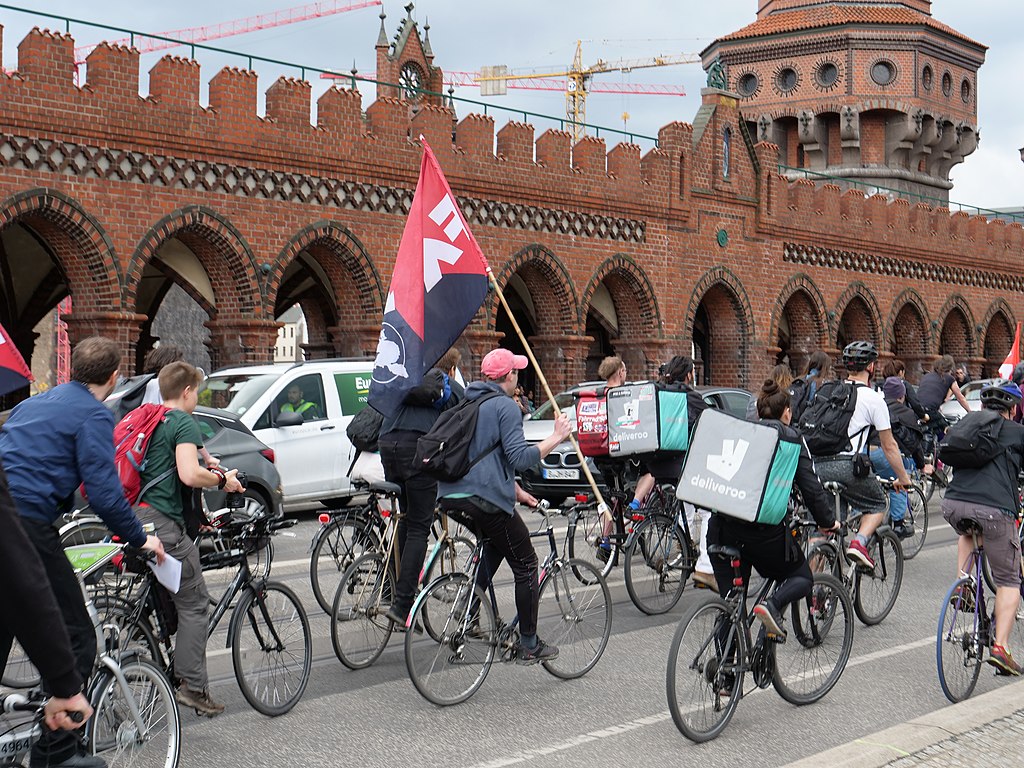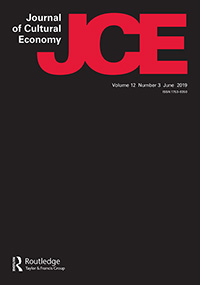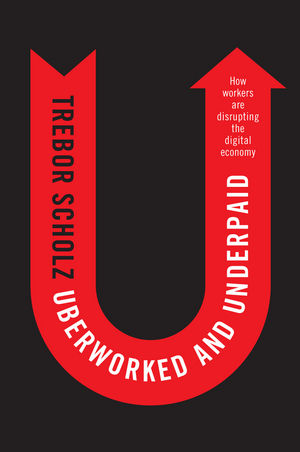The (Rent) Gap between simplicity and complexity
In the inaugural edition of Dialogues in Urban Research, PhD candidate Jelke Bosma provides a short commentary on Elvin Wyly's "The moral rent gap."
In the inaugural edition of Dialogues in Urban Research, PhD candidate Jelke Bosma provides a short commentary on Elvin Wyly's "The moral rent gap."

Liminal Precarity and Compromised Agency: Migrant experiences of gig work in Amsterdam, Berlin, and New York City
This chapter examines what moves migrants in the Global North to take up gig work and stick with it for various periods of time despite its by now well documented precarious conditions, by investigating the role that gig platforms play in…
This chapter examines what moves migrants in the Global North to take up gig work and stick with it for various periods of time despite its by now well documented precarious conditions, by investigating the role that gig platforms play in their life-building trajectories. It offers a discussion of how the topic of precarity has been taken up in the gig economy literature and brings this research into conversation with some recent scholarship on migrant workers’ precarity and agency.

Review: After the Gig: How Sharing the Economy Got Hijacked and How to Win It Back by Juliet B. Schor
Niels van Doorn reviews "After the Gig: How Sharing the Economy Got Hijacked and How to Win It Back" by Juliet B. Schor.
Niels van Doorn reviews "After the Gig: How Sharing the Economy Got Hijacked and How to Win It Back" by Juliet B. Schor.

Platform capitalism’s social contract
Niels van Doorn discusses a number of ways in which platform companies are expanding their services and influence by identifying particular societal needs and marketing themselves as efficient solutions to workers, citizens and civil society…
Niels van Doorn discusses a number of ways in which platform companies are expanding their services and influence by identifying particular societal needs and marketing themselves as efficient solutions to workers, citizens and civil society organisations, as well as local governments.

The Gentrification of Airbnb: Closing Rent Gaps Through the Professionalization of Hosting
In this article, we argue that it is analytically productive to think about the professionalization of hosting on Airbnb in terms of (commercial) gentrification. More precisely, we believe that rent gap theory is helpful to advance our understanding…
In this article, we argue that it is analytically productive to think about the professionalization of hosting on Airbnb in terms of (commercial) gentrification. More precisely, we believe that rent gap theory is helpful to advance our understanding of why and how professionalized hosting has become an increasingly salient phenomenon and for centering the active role of Airbnb as a platform operator. We develop the notion of platform-scale rent gaps to explain the economic logic that drives Airbnb to professionalize its hosts and gentrify its platform. We then discuss Airbnb’s professionalization programs and tools, showing how some of its most substantial resources primarily cater to large-scale property managers who, like Airbnb itself, seek to identify and close rent gaps on the platform. This consequently creates the conditions for uneven business development opportunities among hosts, which we illustrate by focusing on how two different types of hosts have sought to professionalize their business in Berlin. Finally, we conclude by speculating on the relationship between the gentrification of the Airbnb platform and urban gentrification.

Gig work as migrant work: The platformization of migration infrastructure
With markets concentrating predominantly in and around large cities, gig platforms across the globe seem to depend as much on the cheap labor of migrants and minorities as on investment capital and permissive governments. Accordingly, we…
With markets concentrating predominantly in and around large cities, gig platforms across the globe seem to depend as much on the cheap labor of migrants and minorities as on investment capital and permissive governments. Accordingly, we argue that there is an urgent need to center migrant experiences and the role of migrant labor in gig economy research, in order to generate a better understanding of how gig work offers certain opportunities and challenges to migrants with a variety of backgrounds and skill levels. To fill this research gap, this article examines why migrant workers in Berlin, Amsterdam, and New York take up platform labor and how they incorporate it into their everyday lives and migration trajectories. Additionally, it considers the extent to which gig platforms are emerging as actors in the political economy of migration, as a result of how they absorb migrant labor and mediate migrant mobilities. We move beyond the existing parameters of gig economy research by engaging with two strands of literature on migration and migrant labor that, we feel, are particularly useful for framing our analysis: the autonomy of migration approach and the migration infrastructures perspective. Combining these conceptual lenses enables us not only to critically situate migrant gig workers’ experiences but also to identify a broader development: the platformization of low-wage labor markets that are an integral component of migration infrastructures.
.jpg)
Actually Existing Platformization: Embedding Platforms in Urban Spaces through Partnerships
Published in a special issue of South Atlantic Quarterly, this paper examines the partnership as a heterogeneous boundary resource that enables platforms to generate dependencies, become locally embedded, and gain power in…
Published in a special issue of South Atlantic Quarterly, this paper examines the partnership as a heterogeneous boundary resource that enables platforms to generate dependencies, become locally embedded, and gain power in urban settings. Pushing back against narratives of platform-driven disruption, which tend to universalize and totalize platform power, we discuss three cases of what we term “actually existing platformization” – a path-dependent and locally situated process in which platform companies engage in various forms of “boundary work” with other actors seeking to retain and/or gain power. Each case focuses on a distinct industry: food delivery, short-term housing rental, and the social/voluntary sector. In each of these domains, we show how asset-light platforms initiate and develop partnerships as a frequently nebulous boundary resource that opens up potential avenues for 1) market consolidation, 2) logistical integration, 3) social mobilization, and/or 4) institutional legitimation. Such strategic moves, we argue, have become particularly pertinent following the Covid-19 pandemic, which has hit urban areas particularly hard and is intensifying certain social dependencies and institutional shortcomings that platforms are seeking to exploit.

Platformization in the third sector: Reframing volunteering and civil society relations as a platform transaction
In addition to platforms in paid consumer transactions, recent years have seen the rise of platforms operating in the third sector. This raises questions on how these platforms are embedded in urban spaces as well as how they reconfigure…
In addition to platforms in paid consumer transactions, recent years have seen the rise of platforms operating in the third sector. This raises questions on how these platforms are embedded in urban spaces as well as how they reconfigure social relations in the city. This article aims to address these questions by examining how volunteer platforms (re)organize civic and social engagement in the city and how volunteering and civil society relations are encapsulated as a platform transaction. Specific attention is paid to the role of Berlin-based volunteer platform GoVolunteer in response to the 2015 refugee ‘crisis’ in Berlin, which spurred the emergence of spontaneous citizen initiatives and a lack of state coordination. By providing a logistical solution to this social-urban crisis the platform aimed to act as digital intermediary in a time of political chaos. As GoVolunteer developed after the peak of the crisis, it leveraged on the multitude of third sector organizations present in the city, established a large team of interns carrying out the daily operational tasks behind the scenes, and developed partnerships with the Berlin Senate.

Digital Care Spaces: The Particularities of a Digital Homecare Platform
Welfare state restructuring is generally accompanied by multiple forms of privatization, including the delegation of care responsibilities to both private enterprises and private (family) networks. In turn, these new responsibilities bring…
Welfare state restructuring is generally accompanied by multiple forms of privatization, including the delegation of care responsibilities to both private enterprises and private (family) networks. In turn, these new responsibilities bring forth the rise of new care spaces in which care is provided or mediated. This chapter develops the concept of ‘digital care spaces,’ by zooming in on the operation of a digital platform brokering in-home care. It is argued that these digital care spaces are simultaneously locally and globally embedded and provide a response to the opportunities and struggles that accompany the privatization of care.
This chapter is a part of the book Care and the City: Encounters with Urban Studies.

Odds Stacked Against Workers
This article, co-authored with Julie Chen (University of Toronto) presents a cross-national comparative study that examines how American and Chinese platform companies approach the…
This article, co-authored with Julie Chen (University of Toronto) presents a cross-national comparative study that examines how American and Chinese platform companies approach the gamification of food delivery. The study, based on ethnographic fieldwork in New York City and Beijing, highlights how couriers in both cities negotiate the gamified systems designed to convince them to log in and keep working. We argue that the deeply financialized industry of platform-based food delivery compels companies to implement data-driven gamification techniques, in an effort to manipulate their flexible labor supply in the most agile and cost-effective way possible. Accordingly, we posit gamification as not only a salient form of “algorithmic management” but also as a central pivot connecting labor process datafication to financialization. Through an analysis of couriers’ experiences with two nationally distinct approaches to labor gamification, we challenge existing understandings of algorithmic management that are largely based on the operations of Western platforms.

Actually existing platformization: Embedding platforms in urban spaces through partnerships
In this paper, upcoming in a special issue of South Atlantic Quarterly, we examine the partnership as a heterogeneous boundary resource that enables platforms to generate dependencies, become locally embedded, and gain power in urban settings.…
In this paper, upcoming in a special issue of South Atlantic Quarterly, we examine the partnership as a heterogeneous boundary resource that enables platforms to generate dependencies, become locally embedded, and gain power in urban settings. Pushing back against narratives of platform-driven disruption, which tend to universalize and totalize platform power, we discuss three cases of what we term “actually existing platformization” – a path-dependent and locally situated process in which platform companies engage in various forms of “boundary work” with other actors seeking to retain and/or gain power. Each case focuses on a distinct industry: food delivery, short-term housing rental, and the social/voluntary sector. In each of these domains, we show how asset-light platforms initiate and develop partnerships as a frequently nebulous boundary resource that opens up potential avenues for 1) market consolidation, 2) logistical integration, 3) social mobilization, and/or 4) institutional legitimation. Such strategic moves, we argue, have become particularly pertinent following the Covid-19 pandemic, which has hit urban areas particularly hard and is intensifying certain social dependencies and institutional shortcomings that platforms are seeking to exploit.

Platformed professionalization: Labour, assets, and earning a livelihood through Airbnb
Based on fieldwork in Berlin, this paper tries to disentangle what 'professionalization' on Airbnb entails and who is able to take part in such processes.
Based on fieldwork in Berlin, this paper tries to disentangle what 'professionalization' on Airbnb entails and who is able to take part in such processes.

Stepping Stone or Dead End? The Ambiguities of Platform-Mediated Domestic Work Under Conditions of Austerity. Comparative Landscapes of Austerity and the Gig Economy: New York and Berlin
This book chapter is part of an edited collection titled Working in the Context of Austerity: Challenges and Struggles, edited by Donna Baines and Ian Cunningham. The chapter examines how, under nationally and locally distinct conditions…
This book chapter is part of an edited collection titled Working in the Context of Austerity: Challenges and Struggles, edited by Donna Baines and Ian Cunningham. The chapter examines how, under nationally and locally distinct conditions of austerity urbanism, marginalized workers navigate platform-mediated gig economies. It focuses specifically on the experiences of immigrants and minorities working through domestic cleaning platforms. In NYC, we meet Kenny, an African American cleaner who was driven to the Handy platform – and to cleaning work more specifically – through his encounters with labor activation schemes. He has an ambivalent relationship to the platform, which provided him with a somewhat steady income stream when he sorely needed one, while also making it difficult to transition out of gig work and into a more secure and sustainable occupation. In Berlin, we hear from Kostas, a young Greek man who left his austerity-ridden country to look for better opportunities in the nation widely held responsible for enforcing the measures that bled Greece dry. Yet when such opportunities proved harder to come by than he had initially imagined, he turned to Helpling as an easily accessible “employer of last resort” (sans employment contract). Like Kenny, Kostas has a deeply ambivalent relationship to the platform, which is nevertheless articulated in distinctive ways. The paper concludes by stressing the value of cross-national comparative ethnography as a methodological approach able to grasp the local iterations of global phenomena like “neoliberalism", “austerity” and "gig work", while highlighting the deep yet severely unequal mutual dependency between local-serving labor platforms and migrant/minority workers.

From a Wage to a Wager: Dynamic Pricing in the Gig Economy

Disrupting ‘Business as Usual’: Covid-19 and Platform Labor
This article evaluates the impacts of Covid-19 on platform-based gig work. It notes a shift in the service market towards on-demand delivery at the expense of ride hailing and domestic cleaning. Moreover, the public-private partnerships that…
This article evaluates the impacts of Covid-19 on platform-based gig work. It notes a shift in the service market towards on-demand delivery at the expense of ride hailing and domestic cleaning. Moreover, the public-private partnerships that platform companies have entered into with the public administration in NYC and other contexts indicate that platforms are becoming essential infrastructure, not just for service provision, but also for safeguarding the social reproduction of vulnerable groups. The consolidation of platform companies' business interests and social stature hides from view the struggles of the workforce that shoulders massive risk with little social protection.

At what price? Labour politics and calculative power struggles in on-demand food delivery
This article, part of the special issue of Work Organization, Labour & Globalisation on "The Algorithm and the City", asks what can be gained by making calculability a pivotal demand for wage politics in gig economies characterised by…
This article, part of the special issue of Work Organization, Labour & Globalisation on "The Algorithm and the City", asks what can be gained by making calculability a pivotal demand for wage politics in gig economies characterised by dynamic fee structures. It examines how a small group of Berlin-based food delivery workers attempted to challenge Deliveroo's market power by building their own makeshift calculative equipment to help them ‘reverse engineer’ the company's fee pricing algorithm. It then documents the difficulties these ‘riders’ experienced when attempting to translate their fight for calculable earnings into a more comprehensive labour politics. Finally, the article addresses the limits of market-based struggles over calculative power, against the background of a still pervasive ‘platform exceptionalism’: a socio-legal imaginary that treats platform companies as unique business entities, enabling them to engage in regulatory arbitrage while contractually enforcing the subordination and rightlessness of gig workers.

Where Data and Finance Meet: Dual Value Production in the Gig Economy
A version of this working paper will appear in the edited volume Platform Economy Puzzles: Unravelling the Gig Work Paradox, edited by Jeroen Meijerink, Giedo Jansen, and Victoria Daskalova.
The platform economy puzzle we…
A version of this working paper will appear in the edited volume Platform Economy Puzzles: Unravelling the Gig Work Paradox, edited by Jeroen Meijerink, Giedo Jansen, and Victoria Daskalova.
The platform economy puzzle we attempt to solve in this chapter is how gig economy companies can continue to grow their business despite regularly incurring mind-boggling losses. While the first step toward solving this puzzle is easily made, by bringing into focus the crucial role of venture capital and investment firms, this immediately requires us to confront a more puzzling reality: the fact that these firms have continued to fund loss-making gig companies operating in industries with extremely thin margins. To make sense of this situation, we believe it is necessary to start by asking a deceptively basic question: What kind of work is platform-mediated gig work? Phrased differently, what kinds of value are created through platform labor? To begin solving our platform economy puzzle, then, we introduce the notion of “dual value production”, which describes how platforms capture two kinds of value from gig work: the monetary value associated with the service transaction and the more speculative and volatile types of value associated with the data generated during service provision. We elaborate on the construction of data as a specific asset class and consider the nature of the data asset. Shifting our perspective from the platform to gig workers, we subsequently discuss two grassroots initiatives that resist the unbridled data extraction from gig work and attempt to reclaim their data assets. The next section takes another step toward solving our puzzle, as we move up the value chain and examine the role of what we call “meta-platforms”. It is on this level that we are confronted with the true power brokers of the platform economy, and we therefore end our chapter by proposing an ambitious set of regulatory and policy measures that could curb this unprecedented power.

Migration and Migrant Labour in the Gig Economy: An Intervention
In urban gig economies around the world, platform labour is predominantly migrant labour. Yet the academic literature on the intersection of the gig economy and labour migration remains scant. Our experience with two action research projects,…
In urban gig economies around the world, platform labour is predominantly migrant labour. Yet the academic literature on the intersection of the gig economy and labour migration remains scant. Our experience with two action research projects, spanning six cities on four continents, has taught us how platform work impacts the structural vulnerability of migrant workers. This leads us to two claims that should recalibrate the gig economy research agenda. First, we argue that platform labour simultaneously degrades working conditions while offering migrants much-needed opportunities to improve their livelihoods. Second, we contend that the reclassification of gig workers as employees is by itself not sufficient to counter the precarisation of migrant gig work. Instead, we need ambitious policies at the intersection of immigration, social welfare, and employment regulation that push back against the digitally mediated commodification of migrant labour worldwide.

Platform Capitalism’s Hidden Abode: Producing Data Assets in the Gig Economy
In this article, we argue that the governance of gig work under conditions of financialised platform capitalism is characterised by a process that we call “dual value production”: the monetary value produced by the service provided is augmented…
In this article, we argue that the governance of gig work under conditions of financialised platform capitalism is characterised by a process that we call “dual value production”: the monetary value produced by the service provided is augmented by the use and speculative value of the data produced before, during, and after service provision. App‐governed gig workers hence function as pivotal conduits in software systems that produce digital data as a particular asset class. We reflect on the production of data assets and the unequal distribution of opportunities for their valorisation, after which we survey a number of strategies seeking data‐centric worker empowerment. These strategies, we argue, are crucial attempts to push back against platform capitalism’s domination, bankrolled by what we term “meta‐platforms”. Ultimately, it is the massive wealth and synergetic capacities of meta‐platforms that constitute the most formidable obstacle to worker power and social justice in increasingly data‐driven societies.

Is solidariteit een kwestie van digitale bemiddeling?
Article published on Sociale Vraagstukken (Dutch)
Abstract: Door de coronacrisis laten mensen digitale platforms zoals Airbnb en Uber vrijwel links liggen. Buurt- en vrijwilligersplatforms daarentegen worden overstelpt door mensen…
Article published on Sociale Vraagstukken (Dutch)
Abstract: Door de coronacrisis laten mensen digitale platforms zoals Airbnb en Uber vrijwel links liggen. Buurt- en vrijwilligersplatforms daarentegen worden overstelpt door mensen die hun hulp aanbieden. Is solidariteit een simpele kwestie van digitale bemiddeling geworden?

Weathering winner-take-all. How rankings constitute competition on webcam sex platforms, and what performers can do about it
Forthcoming in: David Stark (ed.), The Performance Complex: Competitions and Valuations in Social Life, Oxford: Oxford University Press.
Over the last decade, the global sex industry has been radically transformed by the rise of webcam…
Forthcoming in: David Stark (ed.), The Performance Complex: Competitions and Valuations in Social Life, Oxford: Oxford University Press.
Over the last decade, the global sex industry has been radically transformed by the rise of webcam sex platforms. In this essay we show how rankings are constitutive of competition in this new, emerging part of the sex industry. The ranking algorithms are highly contested among performers, in particular because of their opaque nature and the strong winner-take-all dynamics which they propel. Creating deep uncertainty and anxiety among performers, the algorithms are widely seen as unfair. However, the wider assemblage of market devices constituted by webcam sex platforms, enable performers to circumvent the rankings at least to some degree. Moreover, on discussion forums where performers negotiate strategies to make a living, they actively share experiences of algorithms on competing platforms, discuss which algorithm suits their interests best, and consider vacating to rival platforms. Indeed, how market competition is organized within platforms, is constrained by competition between them.

A new institution on the block: On platform urbanism and Airbnb citizenship
This article argues that Airbnb should be understood as a new urban institution that is transforming relations between market, state, and civil society actors. Taking the Airbnb Citizen advocacy initiative as my case, I examine how this transnational…
This article argues that Airbnb should be understood as a new urban institution that is transforming relations between market, state, and civil society actors. Taking the Airbnb Citizen advocacy initiative as my case, I examine how this transnational “home sharing” platform achieves such transformations, which in turn requires an investigation into the specific nature of Airbnb as an institutional form. Assuming the agenda-setting role of the urban “regulatory entrepreneur,” Airbnb aims to co-shape the terms of current and future policy debates pertaining not just to home sharing/short-term rental but also to the very fabric of city life. It pursues this mode of “platform urbanism” by mobilizing its user base, which it frames as a community of entrepreneurial middle-class citizens looking to supplement their income in a climate of economic insecurity and tech-enabled opportunity. Yet, who is the “Airbnb Citizen” and what are the opportunities and risks associated with platform-mediated citizenship?

Platform labor: on the gendered and racialized exploitation of low-income service work in the ‘on-demand’ economy
How does one value something one cannot and often does not want to see? How do contemporary digital platforms and their infrastructures of connectivity, evaluation, and surveillance affect this relationship between value and visibility, when…
How does one value something one cannot and often does not want to see? How do contemporary digital platforms and their infrastructures of connectivity, evaluation, and surveillance affect this relationship between value and visibility, when it is mediated through the problem of labor as at once a commodity and a lived experience? And how can these infrastructures be mobilized in projects that aim to build different kinds of platforms – the kinds that support the revaluation low-income service work? This essay addresses these questions by examining the gendered, racialized, and classed distribution of opportunities and vulnerabilities associated with digitally mediated service work, or what I call platform labor. The argument will unfold in four parts. First, I briefly situate the ‘on-demand’ economy within the context of neoliberal socio-economic reforms that have, over the past four decades, shaped our present circumstances. Second, I argue that labor platforms should be understood as new players in the temporary staffing industry, whose devices and practices exacerbate the already precarious conditions of contingent workers in today’s low-income service economy. They do so by (1) bolstering the immunity of platform intermediaries and clients, (2) by expanding managerial control over workers, and (3) by orchestrating a pervasive sense of fungibility and superfluity with respect to this workforce. Third, after a short overview of the gendered and racialized history of service work, I analyze how this history extends into the networked present of our platform economy. Finally, I address the potential of ethnography, on the one hand, and platform cooperativism, on the other, to critically empower low-income service workers operating through platforms.







